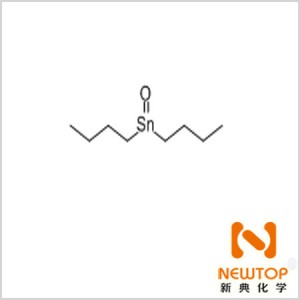Overview:
Product Name: Dibutyltin oxide (Ultra Pure) 818-08-6
Product code: DBTO-GR
Aliases: Dibutyloxotin
Molecular formula: C8H18OSn
Molecular weight: 248.94
CAS Registry Number: 818-08-6
EINECS registration number 212-449-1
InChI: 1S/2C4H9.O.Sn/c2*1-3-4-2;;/h2*1,3-4H2,2H3;;

Basic Information:
- English name: Dibutyltin Oxide
- CAS number: 818-08-6
- Molecular formula: C8H18OSn
Security Information
Safety Instructions: S24/25: Prevent skin and eye contact.
Dangerous goods mark: TT: Toxic substance
Hazard category code: R25: Toxic if swallowed.
Dangerous goods transport number: UN3146
msds report: dibutyltin oxide msds report
use:
White or light yellow powder, insoluble in water and most organic solvents, but may dissolve in the reaction of organic acids, alcohols and esters
White powder with special fragrance, insoluble in water and most organic solvents, soluble in strong alkali and mineral acid
Used for the synthesis of saturated polyester for powder coating, coil (steel) material coating, insulating paint, etc.; for the synthesis of unsaturated polyester; for PBT
Synthesis of engineering resins and synthesis of other esterification and transesterification products
Used as a raw material for plastic stabilizers, it can be used to synthesize a series of organic tin products of lauric acid type, maleic acid type and mercaptan type; used as a synthesis or catalyst in paint, medicine, petrochemical industry
Storage and transportation:
Should be sealed and stored in a dry, cool and ventilated warehouse
package:
200KG/drum Storage: It is recommended to store in a dry and cool area with proper ventilation. After the original packaging, please fasten the packaging cover as soon as possible to prevent the water and other substances from mixing into the product and affecting its performance. Store in a cool, dry place, keep the container sealed and avoid contact with oxides. Do not breathe dust, avoid skin and mucous membrane contact. Smoking, eating and drinking are prohibited in the workplace. After work, shower and change clothes. Store contaminated clothing separately and wash it before reuse. Maintain good hygiene habits.

